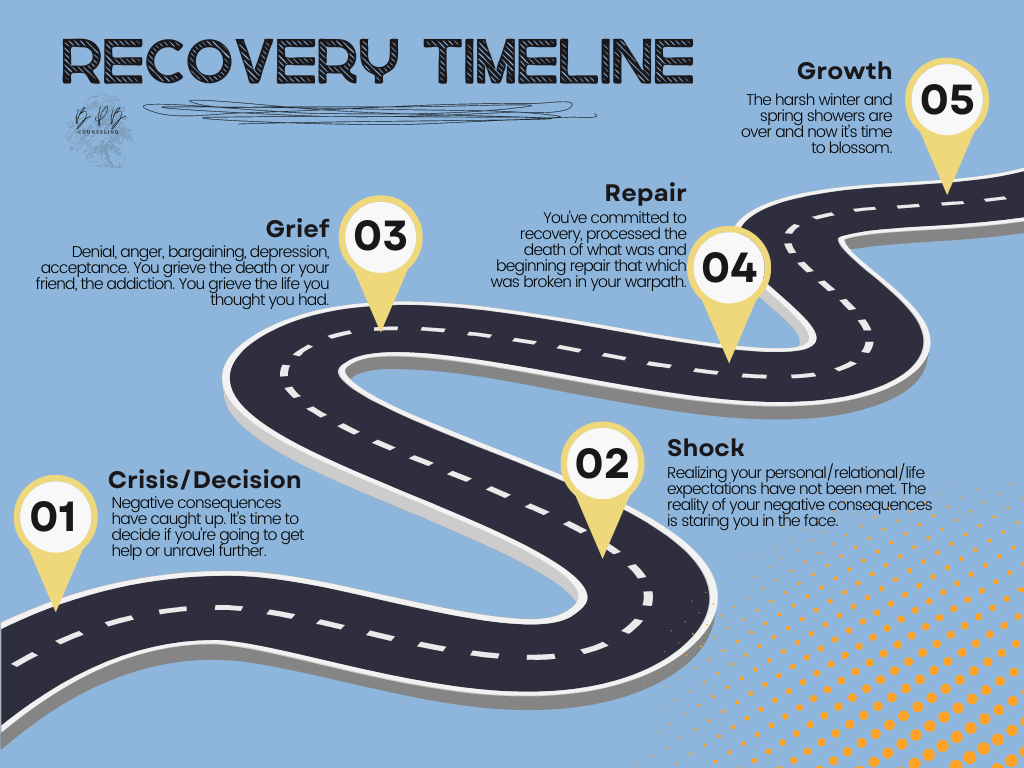Devastation to Prosperity: Five Phases of Sex Addiction Recovery
Sex Addiction, porn addiction and compulsive sexual behavior disorder are becoming increasingly serious problems in our society. The addict’s personal life, relationships, and work can all suffer significant harm as a result of this addiction. It is essential that you have the understanding that recovery from sex addiction is a journey, and that along the way, you will progress through a number of distinct phases as you heal and mature. The following is a 5-step timeline that will assist you in comprehending the process of healing as well as what to anticipate during each stage of the process.
1) Initial Crisis or Decision Making: This is the stage in which you come to the understanding that you have a problem and need to seek help. This stage can also be referred to as the "decision making" stage. Because of the significant amount of bravery and self-awareness that is required, this level can be challenging. Having said that, this is the first step toward leading a life that is both healthy and happier.
2) Shock from Realizing Your Life is Going to Shift: This stage can be daunting as you start to grasp the influence that your addiction has had on your life. During this stage, you may experience shock from realizing that your life is going to change. Realizing that you are not the person you thought you were or that your life or relationship is not what you thought it was can be a rude awakening. At this point, the individual may experience feelings of disbelief and denial.
3) Grief is the next step, and it is at this stage that you will begin to mourn the realizations you had during the shock stage. This can be a challenging period because you may have the impression that you have lost a close friend in the form of your addiction. It is essential to have the perspective that experiencing grief is a natural and expected part of the healing process and that you will emerge from it stronger and more resilient.
4) Repair. When you have finished working through your feelings of loss, it is time to begin mending the wounds that have been created as a result of the situation. It's possible that this will need you to work on repairing relationships, your profession, your money account, and most importantly, yourself. In this phase of your journey toward a better future, it is critical to place a strong emphasis on practicing self-love and self-care.
5) Growth. After completing all of the necessary procedures and repairs, it is now time for you to blossom and flourish. During this period, it is important to be open to new experiences, to continue developing your talents, and to assume more responsibility for your life. It is imperative that you have a solid understanding of the fact that you cannot skip any of the stages, since each stage is necessary for a good recovery.
Here’s a list of ten things you can do focus on during a period of growth:
Maintain your own health and happiness by taking care of yourself on a daily basis with things like exercise, meditation, and a balanced diet.
Plan for success by figuring out what it is you want and developing a strategy to get there. Starting with simple, attainable objectives is a great way to boost your self-esteem and feel a feeling of accomplishment.
Volunteering is a great way to give back to the community and meet new people, all while boosting your own sense of worth and pride.
Spend time on things that interest you and help you grow as a person.
Keep your support system active by surrounding yourself with upbeat, encouraging people.
Cultivate an attitude of gratitude by making it a habit to consistently thank the people and things that contribute to your pleasure and well-being.
Rather than relying on unhealthy methods to handle stress, try new things like journaling, creating art, or going for a run.
Accept the consequences of your behavior: Recognize your own shortcomings and make efforts to heal fences with those you've wronged.
Strike a balance in your life between your professional obligations, personal relationships, your leisure time, and your own self-care.
Engage in activities that push you out of your comfort zone on a regular basis, such as taking on new duties, volunteering, or learning a new skill.
In conclusion, getting over an addiction to sexual activity is a process that takes a long time, a lot of patience, and a lot of self-awareness. If you have a grasp of the five stages of recovery, you will be better prepared for what is to come. Keep in mind that the process of rehabilitation is not a linear one, and that it is normal to make mistakes and fall down as long as you get back up and keep going ahead. You are capable of beating your addiction and leading a life that is full of fulfillment and joy if you have the correct help and direction.
You can schedule a free initial consult with Blair to discuss your own recovery pathway by clicking here:


